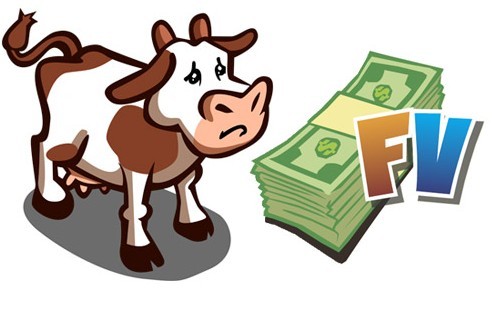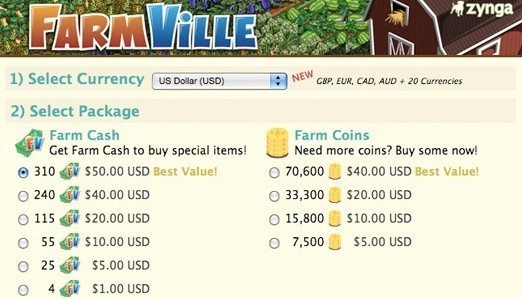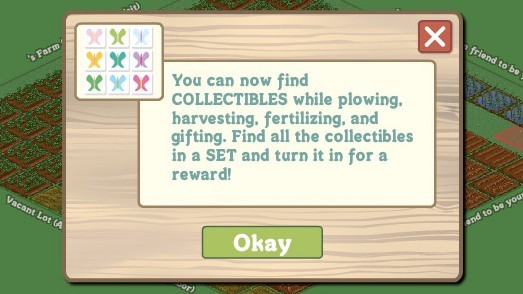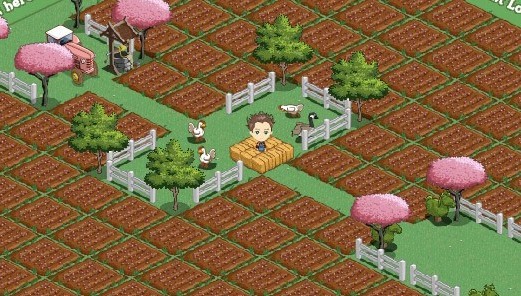揭秘farmville的游戏设置与如何偷走用户时间的(长篇-全文)
FarmVille是个相当聪明的游戏。它由Zynga开发。该公司为Mark Pincus等一群人所建,今年正在盈利5亿美元的轨道上前进。FarmVille正为6100万用户的数字农场做东。
也许这一切你已知悉。而我们现在要研究的是为什么Zynga 和 FarmVill成效如此巨大?为什么它们将继续壮大?它们又是如何改变了游戏的面貌的?
大家在过去某种程度上已受过FarmVille之害,而现在我们要让你知道一个可耻的秘密:事实上没有人真正玩了这个游戏。身为记者,我们深知盲目武断妄加评论是不公正的。为此我们决定花两个星期来研究这游戏是如何运作的,又是什么让它如此吸引人。然后我们得出了结论:好比你的日常工作,它让你为了获得更多的作物而不能轻易离开农场——这可是一件糟糕的事。
轻松种地
经验丰富的互联网农场主可能想要跳过这一小部分,可是这里有些关于FarmVille的幕后故事要告诉你们这些不知不觉陷入恶性循环的人。游戏的安装一般是被设计的简单迅速的。除了界面偶尔的小故障以外(因为即使有着庞大玩家和巨额收入,这游戏技术上仍处于测试阶段),你就只是随着提示开始种地。你为你的“宝贝时光”式装选择外型和性别,然后展示给你的是农场里的购买选项。(笔者觉得是被逼着选择,因为对于接近红头发的人来说几乎没有什么选项,除非你天生是褐紫色的)。这游戏的目标事实上并不清晰,但,就像在现实生活中,唯一的动力是钱财滚滚不断壮大,即便你在FarmVille甚至不能有输赢。游戏供给你“硬币”和“农场金”(往后更多)让你继续玩。买些你喜欢的作物的种子,犁完地之后,播种。
过了市场给指定作物规定的时间后,你可以回来收获,然后赚回一部分你花出去的硬币。播种和犁地也能赚到经验指数——它允许你进入游戏的新项目(更多种类的种子,动物和其他商品)作为进展。
但,FarmVille的一个关键特征,即如何阻碍的现实生活:如果你的作物成熟了,而你没有及时回到游戏里收割,它们就会枯萎。为此,很多FarmVille玩家团体编制战略指导,让你知道那种作物有最佳收割期,哪作物你得在晚上种,哪种作物白天黑夜都可以连续不断地种。甚至还有新闻网站的专题文章如:“洋蓟:周末长假日走开的选择”。所以一旦我们进入游戏,最低限度——你根本不能有超过4天的脱离农场的休息时间。
多数记住进程的电子游戏你离开时它不会改变。出了一些社交游戏如MMOs——它们随着其他玩家的动作而更新——在你没有玩时,电子游戏世界只是暂停。但FarmVille一口气向前,并要求你必须定期回来。
摇钱树(Cash Cows)
像我们曾经经历的,你就这样沉溺于游戏,不过在这游戏变得值得玩之前有个小小的讨厌的槛必须过。随着你持续地点/点/点和耕/种/收,你的可用“硬币”和“农场金”随着经验指数一起增加。
当你收获作物和动物时,你集得FarmVille“硬币”,但当你达到较高经验层次时,你就只获得“农场金”。这两种都可以用现金直接从游戏里买得。这比花5美元在“农场金”上更具诱惑力,尤其当你单从游戏里得到很少,而一些令人垂涎三尺的项目却只能用“农场现金”买到时。
就这样:Zynga靠它的肮脏科技赚了5亿美元。它以人人皆宜的口号把玩家绑进游戏里。不同于赌场供给赌徒豪华房间以期赚回房子的成本,在你第一次耗尽时它甚至会吐出你的硬币。它以一座更大更漂亮更好的农庄为前景诱惑着你;安装游戏时,呈现在你面前的田园风光般富裕农庄的景象描绘,而不是高档房子的那种虚有其表的广告。但你不到处花一两个硬币是几乎不可能得到这些货物的。当Zynga达到6100万网上农夫的用户基量时,它可以轻松地收支相抵了,至少可样说。
不过相比FarmVille和它的姐妹游戏被质疑的一些更为肆无忌惮赚取收入的手段而言,为“硬币”和“现金”付款可视为是一个长期骗局。Zynga的创始人马克‧平卡斯已经承认,“我在book里做了许多可怕的事。仅仅是马上获得收入。我是说,当用户下载zwinky 工具栏时我们就给他们求购筹码,就像——我不知道——我一旦下载它我就不能摆脱它。我们做任何可能的事情,目的只是为了赚钱,以便壮大。”这包括卖给肮脏商人广告空间,用虚假的“网上IQ测试”和免费测试承诺来迷住用户。Zynga和Facebook 11月份遭遇一起集体诉讼。他们起诉游戏发行商通过游戏里的“特价”广告赚了将近三分之一的收入。
The Belted Cow 就是 Princess Diana Beanie Baby
我们说化身农夫让我们想起了水滴娃娃,这种比较不仅仅是审美意义上的。FarmVille超出简单的耗时战法而进入了收藏文化。一旦弄明白如何维持你的农场,你就知道你得或多或少花点你辛辛苦苦赚来的钱。它并不像为了电子教程话费的大学学费,所以FarmVille轻易让你知道你需要哪些项目来完成收集。不管是纽扣、宝贵的石头还是各种树木,这游戏出于自己的利益鼓励完完全全的消费。当你得到一个新的项目,你被创建通知,让你的朋友通过Facebook界面知道,意在鼓励胜人一筹。
不过“市场”是成功的,因为它反映了我们真实生活中的市场;物品有时候被标以高昂的价格仅因为它们是奢侈项m目,这让人们感知到更高的价值。(为什么这么说?打个比方说吧,Belted Cow真的得卖一百万硬币吗?)你
在开始收集的同时,你也开始在炫耀自己的收获,如同往昔的豆豆娃,每个新收集的项目最终都会被一整个新的“限量版”作物项目代替。比如最近英国为迎合游戏而搞的收集小农庄行动,不管农庄里面有什么鬼东西。
通过发行一个永不结束的收集行动,FarmVille永远坚固着自己的存在。它在游戏领域的革命性,在于很少有,如果真的有的话,其他游戏能被它的开发者们如此固执地更新——尽管其他社交游戏和MMOs已经很快跟上模式。当你没有花光买东西的钱,并且没有地方可以后退,你就只是继续购买。
只是越嫉妒,农场越美丽
为了激发长久的收集愿望,FarmVille的用户被要求成为他们Facebook朋友的邻居—而且这游戏的某些方面,,就像花圃和蜂房,没有同胞的帮忙是几乎不可能打开的。在我们的实验中,我们通过两个不同的Facebook帐户建立了不同的FarmVille帐户,目的是想看看用户怎么跟另一个用户联系。在我们的伪农夫之间迅速形成心照不宣的竞争:我们中的一人买了一个仓房之后,另一个也被迫买一个。
你可以争论说FarmVille没有明确地鼓励这种没完没了的嫉妒,但每一个新的“成就”(这成就被游戏里有可能的成千上百的各种“成就”事实所贬值)都会触发一个提示,询问你是否愿意同你的朋友分享这个喜讯。你只能回答“yes”“no”,而只有最不自私的农夫才会选择不要向他的朋友炫耀自己购买了100捆干草的最新成就。
不过这种提示新进起了变化。很多更新一度是自动的,但是,据《纽约时报》报道,“600万厌倦了朋友状态频繁更新的Facebook用户,加入了一个叫‘我不关心你的农场,你的鱼,你的花园,你的黑手党!!!’的组织”。
也许有鉴于此,Facebook开始限制更新,并且——除非你对那些简单烦人信息的威力有任何的怀疑——FarmVille的数字大军已经从8300万用户的高峰下降了26%。
FarmVille 伪装成游戏
回到一月份,媒体评论员兼纽约州立大学水牛城分校(SUNY Buffalo)A.J. Patrick Liszkiewicz做了一个演讲,里面他引证了Roger Caillois的游戏价值理论,并且提到了有关FarmVille的理论。“虽然Caillois说游戏提供的是责任和日常事务之间的间歇休息。”他宣称,“FarmVille是由责任和日常事务定义的。”谈到像Harvester和Seeder这类事项,Liszkiewicz指出,“随着你的FarmVille进程,你开始得到报酬,这让你不用那么频繁地玩。收割机器让你一下点中四个方块,牲口棚和笼子让你可以管理成群的动物,省掉你数百次单调的点击。换句话说,你玩得越多你不得不玩的越少。
Ian Bogost——我们最近提到了他的抵制FarmVille的母牛点击对策理论——写到社交游戏“是那些你不用玩的游戏”。我们不同意这种说法,诚如Liszkiewicz所说,即使我们看到今天社交游戏里的角色面对面打斗。你必须玩FarmVille,如果你不玩,你的作物就会死掉。你被提醒说你的作物可以收成了,你读着你邻居的界面公告。你被邻居赠礼,也被迫送礼回去。(为此,Liszkiewicz说,“正如法国社会学家Marcel Mauss告诉我们的,没有白给的礼物;他们把送者和收者捆绑在互给的循环中。拒绝礼物是不礼貌的,不送还善意也是不礼貌的。”)FarmVille,正像Facebook,是不会轻易放过他的用户的。
不同于传统的模拟城市,FarmVille不允许它的玩家们以为做更多工作以外的方式破坏他们的作品。在模拟城市里,你可以用大火风暴或外星人入侵毁掉你那不如人意的大城市。FarmVille设置成你只可以删掉小块地皮和抛售资产,而不能真正破坏基地。
我们发现自己每天越来越频繁地回到农场。我们陷进驱动游戏的竞争中——为了获得比邻居更多的钱和经验指数,为了有一个更好看更有利可图的农庄。然后,花了两个星期在游戏上后,我们觉得自己好像在做一件相当糟糕的工作。仍然,我们意识到,当我们三更半夜或在周末登录游戏(“只要一分钟!”我们对急得跺脚的重要事务嚷嚷),Zynga也在陷害我们沉迷于它——其实我们一点也不喜欢这样。所以我们做着人们失去理智时做的事,并且逃避资本主义制度;我们抛售每项单独资产,然后把钱花在干草堆上——钱该待的地方。我们不是要说我们没有从FarmVille得到乐趣,我们要说的是最终的放手才是轻松。
(译者:南奇)
FarmVille is a very smart game. It was developed by Zynga, the company founded by serial entrepreneur Mark Pincus, which is on track to pull in $500-million dollars in revenue this year. As of July, FarmVille was hosting the digital homesteads of 61 million users.
But you probably know all that already. What we’re going to examine is why Zynga and FarmVille got that large, why they will continue to grow, and how they have changed the face of gaming.
We’ve blasted FarmVille in our past posts, but we’ll let you in on a shameful secret: none of us had actually ever played the game, and as journalists, we felt that it was unfair to cast judgment so blindly. So we decided to spend two weeks trying to figure out how the game worked and what makes it so attractive. And we’ve come to the conclusion that, like your day job, it’s difficult to simply walk away from your farm for good — and that is a terrible thing.
Farming the Easy Way
Seasoned Internet farmers may want to skip past this bit, but here’s some backstory for those of you oblivious to the downward spiral that is FarmVille.
Game setup is designed to be quick and easy. Despite occasional hiccups with the interface (as the game is technically still in beta, even with its massive user base and revenue), you simply follow the prompts to start farming. You pick the look and sex of your ‘Precious Moments’-esque hayseed, and then are presented with your buying options in the Marketplace. (Your writer feels compelled to note that there are few options open to redheads for verisimilitude, unless you were born “maroon.”) The goal of the game is actually unclear; but, like in real life, the sole motivator is more money and more growth, since you can’t ever “win” FarmVille, or, for that matter, “lose.” The game donates both coins and Farm Cash (more on those later) to get you going. Simply buy some seeds for the crop you wish, and, after tilling the soil, sow your virtual oats.
After the amount of time specified in the Marketplace for a given crop, you can return to harvest, and gain back some of the coins you’ve spent. Planting seeds and tilling your soil will also earn you experience points, which will allow you to unlock new aspects of the game (more varieties of seeds, animals and other goodies) as you progress.
One of the key features of FarmVille, though, is how it encroaches on real life; if your crops mature and you don’t return to the game in time to harvest, they will wilt. Thus, huge communities of FarmVille players have concocted strategy guides to let you know which crops have the best returns, which ones you should grow overnight, and which ones you can plant over and over throughout the day. There are even “news” sites featuring articles like “Artichokes: The Choice for a Long Weekend Getaway,” since — as far as we got in the game, at least — you can’t ever get longer than a four-day respite from your farm.
Most video games that remember your progress don’t change while you’re gone. With the exception of other social games like MMOs — which update as other users play — the video game world pauses when you’re not playing. But FarmVille chugs along and essentially demands that you return on a regular schedule.
Cash Cows
So, you get sucked into playing, just as we did, but there’s a slight boredom threshold that must be crossed before the game becomes rewarding. As you continue to click/click/click and till/plant/harvest, your available coins and Farm Cash increase along with experience points.
You collect FarmVille coins when you harvest plants or animal products, but you only get Farm Cash when you reach a higher experience level. Both can be purchased with real money directly through the game. It is more than tempting to throw away $5 on Farm Cash, especially since you get so little of it through the game alone, and since some of the more covet-worthy items can only be purchased with Farm Cash.
There it is: Zynga’s dirty technique for making its $500 million. It ropes players into the game with the promise that absolutely anyone can play. It will even float you coins the first time you run out, not unlike the casino that gives a high-roller luxury accommodations in anticipation of making back the house’s stake. It dangles the prospect of a bigger, prettier, better farm; as the game loads, you’re faced with idyllic images of well-off farms, not unlike the glossy ads for high-end residences. But it’s nearly impossible to get some of those goods without ponying up a buck or two here and there. When Zynga’s got a user base of 61 million digital farmers, it’s easy enough to make ends meet, to say the least.
But paid-for coins and cash could be considered the long con compared to some of the more unscrupulous methods of revenue generation to which FarmVille and its sister games have been connected.
Mark Pincus, Zynga’s founder, has admitted, “I did every horrible thing in the book… just to get revenues right away. I mean, we gave our users poker chips if they downloaded this zwinky toolbar which was like — I don’t know — I downloaded it once and couldn’t get rid of it. We did anything possible just to just get revenues so that we could grow… ” That included selling ad space to sleazy marketers that hooked users with disguised “online IQ tests” and the promise of free trial offers. Zynga and Facebook were hit with a class-action lawsuit back in November, which accused the game developer of pulling in nearly a third of its cash from the “special offers” advertised through its games.
The Belted Cow Is the Princess Diana Beanie Baby
When we said that your farmer-avatar reminded us of a ‘Precious Moments’ figurine, the comparison was more than just aesthetic; FarmVille goes beyond simple time-suck and into the realm of collectible culture. Once you’ve figured out how to maintain your farm, you realize that you’ve got to spend your hard-earned money somehow. It’s not like your digital spawn will need it for college tuition, so FarmVille conveniently lets you know which items you need in order to complete a collection. Whether buttons, precious stones or just every variety of arbor, the game encourages exhaustive consumption for its own sake. When you acquire a new item, you are advised to let your friends know through your Facebook Wall, which only encourages one-upmanship.
But the Marketplace is successful because it reflects our own real-life market; goods are given sometimes exorbitant prices simply because they are luxury items, which gives them a higher perceived value. (Why, for example, does the Belted Cow fetch an asking price of a million coins?) As you start to collect, you also begin to display your collection. Like the Beanie Babies of yore, each new item collected is eventually supplanted by a whole new crop of “limited edition” items, such as the current New England collection of Delicate Cottages to go along with whatever the hell else has been thrown out there.
By releasing a never-ending stream of collections, FarmVille solidifies its existence in perpetuity. It’s revolutionary in gaming, because few, if any, other games have been so consistently updated by their developers — although other social games and MMOs have quickly followed suit. When you can’t run out of things to purchase, and where there’s no such thing as a recession, you just keep on buying.
Your Farm Is Only as Pretty as the Envy It Inspires
To further motivate this collecting desire, FarmVille users are routinely asked to make neighbors of their Facebook friends — and some aspects of the game, like the construction of nurseries and apiaries, are nearly impossible to unlock without compatriots’ help. In our experiment, we set up two different FarmVille accounts, through two different Facebook accounts, just to see how users could connect with one another. It quickly became an unspoken competition between our fake farms; when one of us bought a barn, the other was compelled to buy one, too.
You could argue that FarmVille doesn’t explicitly encourage this never-ending envy, but each new “achievement” (which is cheapened by the fact that there are hundreds and hundreds of “achievements” possible in the game) activates a prompt asking if you would like to share the news with your friends. It takes just as long to say “yes” as it does “no,” and only the most selfless farmer would choose not to boast of his or her latest conquest in successfully purchasing 100 bales of hay.
But the prompts are a recent change. Many updates used to be automatic, but, as the New York Times notes, “six million Facebook users, who grew tired of constant updates about their friends’ games, joined a group called ‘I don’t care about your farm, or your fish, or your park, or your mafia!!!’.” Possibly as a result, Facebook began to restrict the updates, and — unless you had any doubt about the power of those simple, annoying messages — the FarmVille digital army dropped 26-percent from its peak of 83 million users.
FarmVille Is Work Masquerading as a Game
Back in January, A.J. Patrick Liszkiewicz, a media critic and adjunct professor at SUNY Buffalo, gave a talk, in which he quoted theorist Roger Caillois on the value of gaming, and related said theory to FarmVille. “While Caillois tells us that games offer a break from responsibility and routine,” he asserted, “FarmVille is defined by responsibility and routine.” In speaking of objects like the Harvester and Seeder, Liszkiewicz noted, “As you advance through FarmVille, you begin earning rewards that allow you to play FarmVille less. Harvesting machines let you click four squares at once, and barns and coops let you manage groups of animals simultaneously, saving you hundreds of tedious mouse-clicks. In other words, the more you play FarmVille the less you have to play FarmVille.”
Ian Bogost, whose anti-FarmVille metagame Cow Clicker we recently mentioned, writes that social games “are games that you don’t have to play.” We disagree, as must Liszkiewicz, even if we see eye-to-eye on the role that social games play today. You must play FarmVille; if you don’t, your crops will die. You are reminded that your crops are ready for harvest, and you read your FarmVille neighbors’ Wall posts, announcing their successes in one aspect of the game or the other. You are sent gifts by neighbors, and obliged to send gifts back. (To that end, Liszkiewicz said, “As the French sociologist Marcel Mauss tells us, gifts are never free: they bind the giver and receiver in a loop of reciprocity. It is rude to refuse a gift, and ruder still to not return the kindness.”)
FarmVille, like Facebook, does not let its users go easily.
Unlike the classic SimCity, FarmVille does not allow its users to destroy their creations without still more work. With SimCity, you could blast your withering megalopolis with a firestorm or an alien invasion; FarmVille is set up so that you can only delete plots and sell off your assets, without ever really hitting bottom.
We found ourselves returning to our farm more and more each day. We were roped into the competition that drives the game — to acquire more money and points than our neighbors, and to have a better-looking and more profitable homestead. And, for only two weeks spent playing, we feel like we didn’t do such a bad job. Still, we realized that, as we logged on late at night or on the weekends (“Just for a minute!” we’d tell our foot-tapping significant others), Zynga had snared us in its web, too — and we didn’t like that one bit. So we did what people do when they’ve lost their minds and shirked the capitalist system: we sold off every single asset and put the money in hay bales — and that’s where it will stay. We’re not about to say that we didn’t have fun playing FarmVille, but we will say that it was a relief to finally let go。











































 闽公网安备35020302001549号
闽公网安备35020302001549号